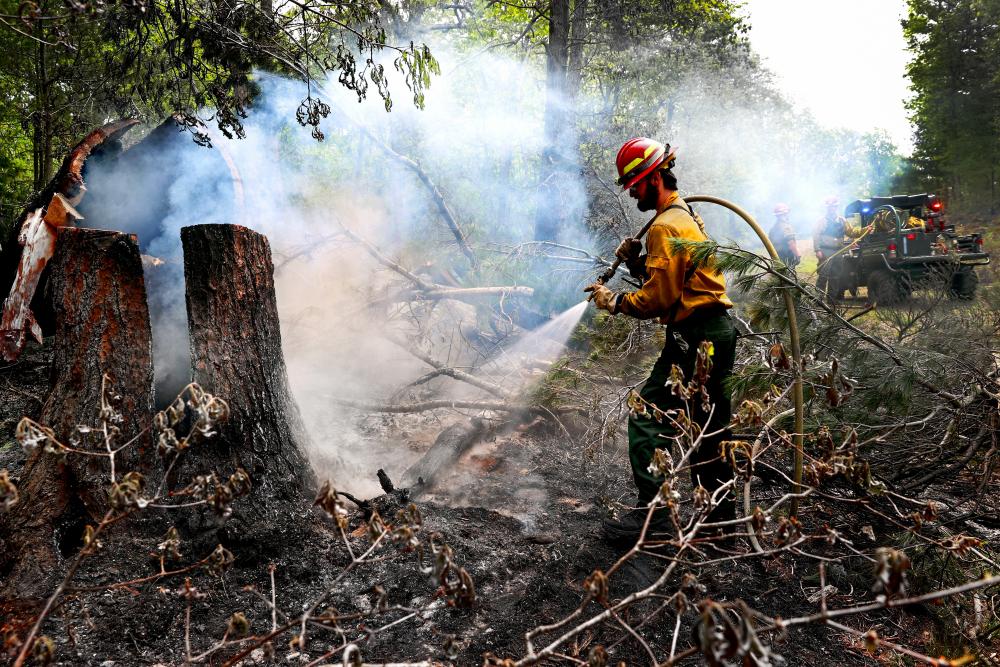
Massachusetts and Connecticut are the first two states in the US to ban the use of toxic PFAS “forever chemicals” in protective gear worn by firefighters.
Turnout gear, including jackets, pants, boots, gloves and other protective equipment that firefighters wear is treated heavily with PFAS that makes it resistant to water and heat, and helps the textiles breathe.
But the protection comes at a steep cost: the International Association of Firefighters (IAFF) estimates cancer from turnout gear accounted for 66% of firefighter deaths from 2002 to 2019.
“This next generation of firefighters – their lives will be saved,” Rich Mackinnon, president of the Professional Firefighters Association of Massachusetts, said in a media statement. “Their families will not have to go through the diagnosis, treatment, and unfortunate death.”
PFAS are a class of about 15,000 chemicals typically used to make products that resist water, stains and heat. They are called “forever chemicals” because they do not naturally break down. They can accumulate in humans and the environment, and are linked to cancer, kidney disease, liver problems, immune disorders, birth defects and other serious health problems.
Gear sold in Massachusetts and Connecticut must be PFAS-free by 2027 and 2028, respectively, while the Massachusetts law also requires any turnout gear manufacturers selling PFAS-treated products to notify the purchaser in writing.
The bills were fiercely opposed by the $5bn turnout gear industry and the nation’s chemical makers, and it is unclear how many states will follow suit – a similar ban proposal died in the California legislature this week just a few days after the Massachusetts governor, Maura Healey, signed the bill.
Diane Cotter, the wife of a Worcester fire department firefighter, Paul Cotter, helped spearhead the Massachusetts effort. Paul developed prostate cancer, which is linked to PFAS exposure, about 10 years ago, when he was 55 years old.
Her crusade started in 2019 when she mentioned her husband had prostate cancer at a lunch with other wives of local firefighters.
“Almost every wife at the table lifted up their head and said: ‘Me too,’” Cotter said, noting that most of the women were only 35 to 55 years old. She described herself as “naive” at the time, armed with “only an expired hairdresser’s license” but willing to take on a then unfriendly firefighter union, state government, chemical industryand turnout gear industry.
“If I was more worldly and went to college, then I don’t think I would’ve taken this on,” said Cotter, whose son also works at the Worcester department.
Her and others’ efforts were met with hostility from a former IAFF leader, Cotter said, adding that he worked closely with state leaders to make sure her efforts did not gain political traction.
That changed when the current IAFF general president, Ed Kelly, took over in 2021 and the union shifted positions on the issue. It backed Massachusetts firefighters independently suing manufacturers, and Kelly issued a statement: “Corporations who sell the products are engaged in a ‘continuous and ongoing public deception’ regarding their risks.”
Suddenly, state political leadership was more amenable to a ban, Cotter said. She was invited to the bill signing last week, a moment she described as “surreal”.
“There was such relief because that work is now done, and such humility, and joy and numbness,” she said.
The American Chemistry Council (ACC), which represents PFAS makers, remained opposed, and the law has broader implications in the fight to regulate PFAS. As PFAS regulations have expanded, the industry has sought to present the chemicals as irreplaceable and essential to products that save lives, such as medical devices, pharmaceuticals or turnout gear.
“This bill may have unintended consequences for the performance of PPE that our firefighters need,” the ACC said in a media statement. “[It] is designed to withstand extreme hazards they face on the job, including exposure to open flames, high temperatures, and potentially dangerous combustion by-products.”
However, some departments have already switched to PFAS-free turnout gear, delivering a blow to the chemical industry’s claims that the products cannot be made without the chemicals.
EMEA Tribune is not involved in this news article, it is taken from our partners and or from the News Agencies. Copyright and Credit go to the News Agencies, email news@emeatribune.com Follow our WhatsApp verified Channel





